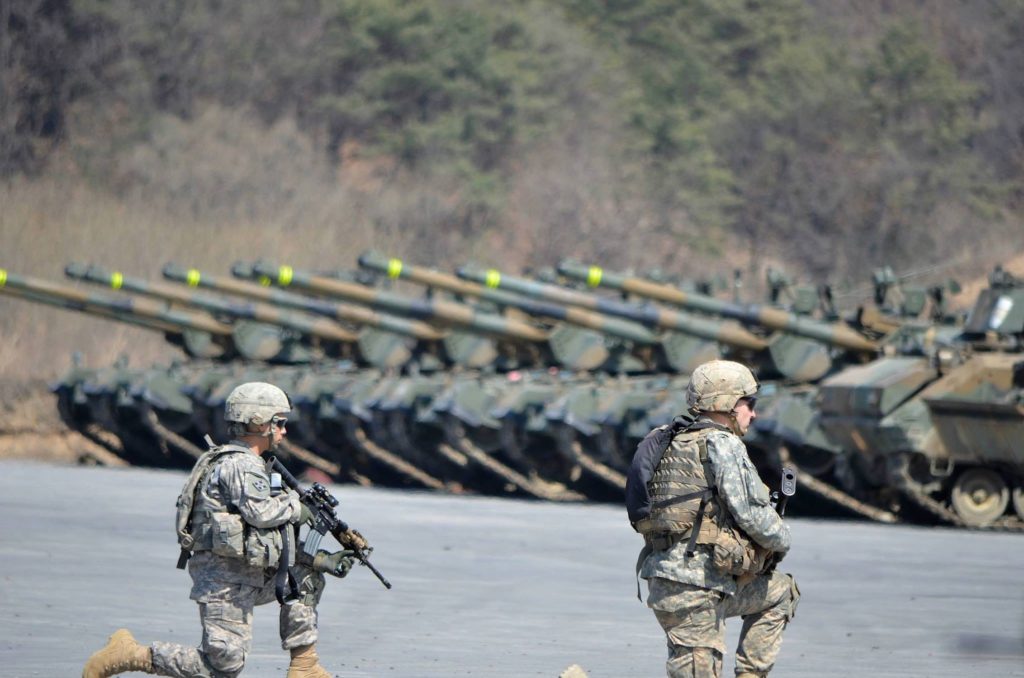SEOUL, South Korea (AFP) – The U.S. and South Korean militaries on Thursday, February 27 postponed forthcoming joint exercises as the Asian country announced its biggest increase in coronavirus cases to date.
The decision to delay the training was made after Seoul declared its highest “severe” alert level over the virus, Combined Forces Command said, adding the postponement was “until further notice.”
The United States has 28,500 troops in South Korea to protect it against the nuclear-armed North, many of them based south of Seoul at Camp Humphreys in Pyeongtaek, Washington’s biggest overseas military facility.
The security allies have previously scaled back annual joint military exercises significantly to facilitate nuclear talks with Pyongyang — which condemns such drills as preparations for an invasion — but a command coordination exercise had been planned for this spring.
The Korea Centers for Disease Control and Prevention (KCDC) announced more than 500 new infections Thursday, by far its largest rise so far as the virus has spread in the world’s 12th-largest economy. A total of 13 people had died, it added.
The South now has 1,766 cases, the highest number in the world outside China, where the disease first emerged in December and has since spread to dozens of countries.
Vice health minister Kim Gang-lip apologised for “causing concern” with the rapid rise.
But the total is expected to increase further after checks began on more than 210,000 members of the Shincheonji Church of Jesus, a secretive entity often accused of being a cult that is linked to around half of the country’s cases.
A 61-year-old female member developed a fever on February 10, but attended at least four church services in Daegu – South Korea’s fourth largest city with a population of 2.5 million and the epicenter of the outbreak – before being diagnosed.
Authorities say the list handed over by Shincheonji omits at least 70,000 recent recruits, which the sect said could not be given as they were not yet full members.
South Korea has an advanced medical system, a free press and a strong culture of public accountability, characteristics which observers say lie behind its comparatively high statistics: so far it has carried out more than 65,000 tests on suspected patients nationwide.
But it is politically polarised and more than one million people have signed a petition on the website of the presidential Blue House, calling for the impeachment of President Moon Jae-in over his handling of the outbreak.
Daegu’s hospitals have struggled to cope with the caseload and mayor Kwon Young-jin appealed for medical volunteers to step forward: “I plead to local doctors and nurses. We are absolutely lacking medical staff to treat patients.”
Growth forecast cut
Officials have urged the public to be extra cautious, advising citizens to stay home if they have a fever or respiratory symptoms.
Scores of events have been cancelled or postponed as the outbreak has spread in the world’s 12th-largest economy, from K-pop concerts to the start of the K-league football season, while museums and other public venues have closed.
The Korea Baseball Organization said Thursday it was cancelling all 50 pre-season games that were set to begin March 14.
The Bank of Korea has lowered the country’s growth outlook for this year to 2.1%, down 0.2 percentage points, citing a contraction in consumption and slowing exports due to the spread of the virus.
Central bank governor Lee Ju-yeol said he expected the economy to shrink in the first quarter, adding: “I believe the impact will be bigger than any other virus outbreaks.”
The Catholic Church in South Korea has said it would suspend all public masses at more than 1,700 churches across the country in response to the contagion.
A group of Catholics who recently returned from a pilgrimage to Israel had been one of the cluster infections.



